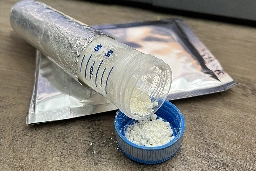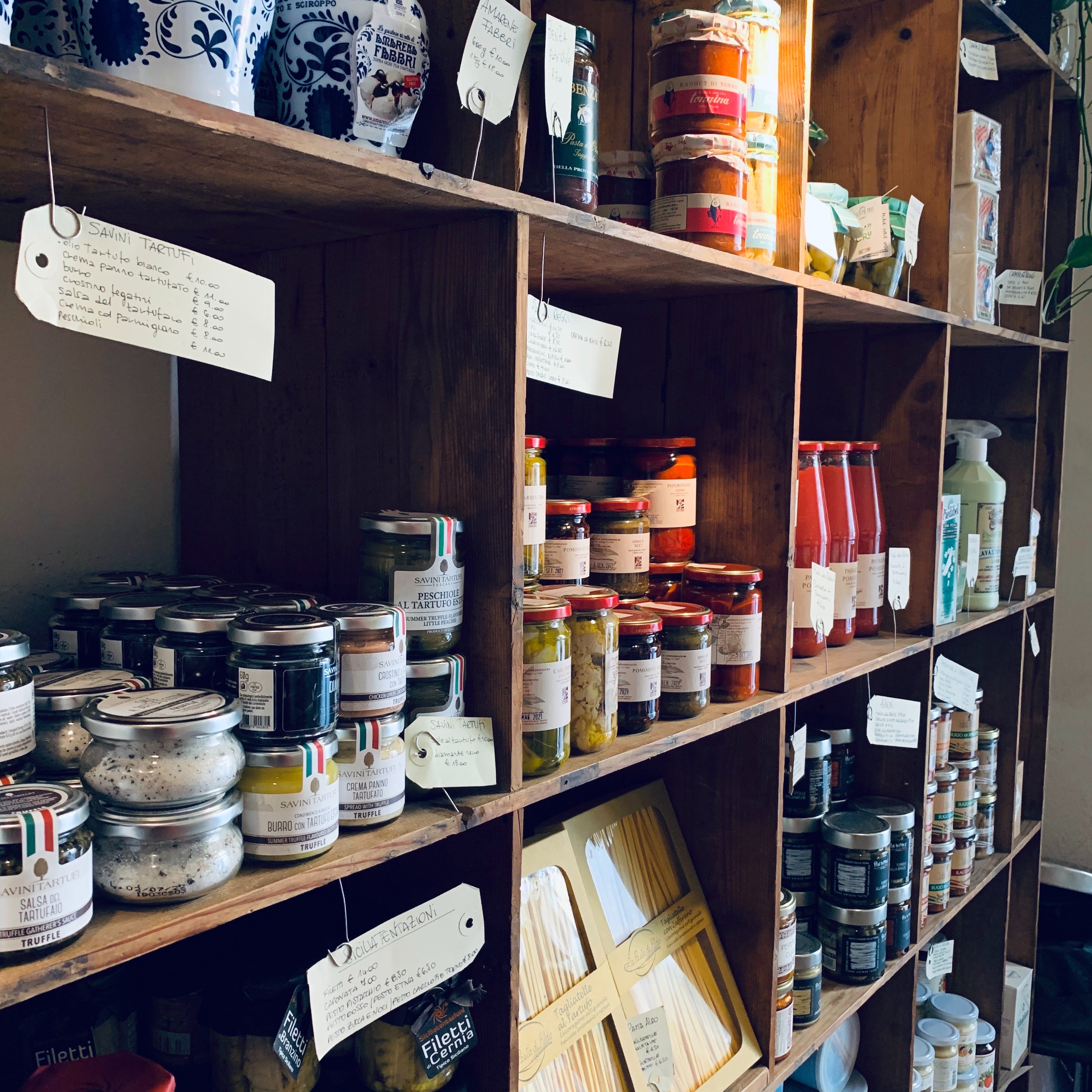
Preppers
- Water crises
Atlanta is currently suffering from a major water main break that has put half the city under a boil-water advisory. The city government is reportedly bringing in pallets of bottled water, so there hopefully will not be any real crisis here. But I expect this will be a wake-up call for a lot of people who have not given much thought to prepping.
There are also major droughts in Mexico City and Bogota, threatening to dry out their taps.
Do you all have any tips for folk with how to prep for loss of water service, especially for folk in cities where they may not have a ton of storage space or land for collecting water?
I'll start off by referring to the US FEMA guidelines: One gallon of water per person per day. In my experience the best format is those upright 1-gallon bottles with the opening in the top middle (not the milk-jug style with the handle).
- Droughts in Europe
A nice overview if drought areas in Europe.
- [Discussion] What are your cold weather skills and preps?
Just for the sake of communication and keeping this sub relevant: how are you situated (rural/city/flat/house) and what are your skills and preps to e.g. deal with harsh weather, a short-term cut off of energy and heating or cold and ugly weather on the trail with your BOB.
- Blackout Kit: Where to find reliable recommendations/reviews of equipment?
I've seen several good recommendations for what equipment I need, but I don't know who to trust for reliable products. For example, flashlights and multi-tools. I see a lot of flashlights on Amazon, but I don't know if one is "better" than another.
I'm wondering if there's a "you can't go wrong with these brands/models" that's available.
- PSA: Sawyer Mini Counterfeitwww.sawyer.com Counterfeit
The Sawyer Squeeze comes with a lifetime warranty from manufacturer defects for the life of the filter.
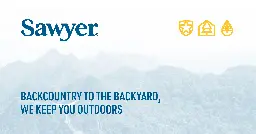
With black week and some headlessness I bought my second Sawyer Mini on eBay. I hoped for a sellout, but when I received shipping information from China and was not able to cancel the order, I already knew whats going down 😂.
Anyhow, I received a cheeky counterfeit and am now talking to Sawyer and eBay. I'm not worried about the money, it is more like these filters can be life threatening and should be pulled from market.
- Bugging Out To Nowhere: A SHTF Fantasyinvidious.lunar.icu Bugging Out To Nowhere: A SHTF Fantasy
At risk of being out of my lane, I'll be discussing one of the most prevailing SHTF plans: bugging out to the wilderness, and why I think it's a pretty poor risk prop. VENTURE SURPLUS Use BFOCT for 10% off (limited time) PONCHO LINER: https://www.venturesurplus.com/products/genuine-us-military-pon...

- The basics: bugging out vs bugging in
If you spend any amount of time on just about any prepper forum, you'll see terms like "bugging in" or "bug-out bag". There is a TON of bad information out there, so I wanted to take a second and make a no-nonsense, plain-language primer for anyone just getting started on their preparedness journey.
Put simply, when people talk about "bugging out", they mean rapidly evacuating an area (usually their home) in an emergency. This can be due to things like natural disasters, chemical spills, civil unrest, war, or getting a call about a sick family member at 3 AM. Bugging out can be, but doesn't have to be, permanent.
You'll also see some people talk about "bugging in". This means that instead of evacuating, they stay at home in an emergency. There's merit to this approach as well: you already know your home and community, and all your supplies are (hopefully!) already there. This is especially appropriate in emergencies that are either very short in duration (like a two-day power outage) or very extreme in scope (like natural disaster making major roads out of your area impassible).
Whether it's better to bug out or bug in depends on your needs and circumstances; there is no "best" answer that applies equally to everyone in every situation. But there are a few things you can do in advance to help you decide:
- Think about the emergencies that are likely to occur in your area. Severe weather? Spill at the nearby chemical plant? Start an emergency manual by listing these emergencies and how you'd react. Document any special circumstances that might change your normal plan.
- In your emergency manual, decide on a bugout threshold for each emergency. Maybe "widespread flooding" isn't worthy of evacuation because your home is on a hill, but "Somename River exceeds 35 feet" cuts off the main route in and out of your home.
- Also in your manual, decide under what circumstances you'll bug in. For example, it may be safer to stay home during a tornado outbreak.
- Pick one or more bugout locations in advance. Wherever you go should be far enough away that it's unaffected by whatever you're evacuating from. If you plan on bugging out to a friend's or family member's home, make sure they know about your plans in advance! Just showing up unannounced is a great way to be turned away.
When the time comes and you decide to bug out, review your plans in light of whatever the actual circumstances are at that time. Is your destination still unaffected? Can you get there safely? Is your family (including pets!) able to travel safely? Just because you planned to bug out (or bug in) doesn't necessarily mean you have to do so. Always stay flexible. Unyielding adherence to plans is a fast path to failure.
Finally, you'll see a lot of people talking about a bugout bag ("BOB"). This is basically a pre-packed backpack or duffle bag that you can grab on your way out the door. There are lots of good guides on building one, and I can make another post going into more details later (feel free to beat me to it). But a basic checklist includes:
- A seasonally-appropriate change of clothes. At a bare minimum, one or two pairs of socks & underwear.
- Any medication you may need. If you have prescriptions, talk to your doctor. "Hey doc, I'd like to keep a small supply of my prescription on hand in case I have to travel in an emergency and forget to pack. How can I do this?"
- A basic first aid kit. Building one yourself is usually cheaper and gets you better quality gear, but you can also buy a small ready-made kit just about anywhere.
- A multi-port USB charger, a small travel surge protector, and enough cables to charge your gear.
- Two compact flashlights with spare batteries. If you're using alkalines, keep the batteries in a separate container to reduce the odds of leaks.
- A paper map of your region. You can get these for free through most states' visitor centers.
- A basic toiletry kit. In my case: bar soap, soap sock, travel size toothpaste / shaving cream / deodorant / mouthwash, cartridge razor. I normally use a safety razor with blades, but if you have to take your bugout bag through TSA, you may get a hard time about the razor blades.
- Poncho, emergency blanket.
- A printout containing emergency contacts (family members, employer, bank / credit card issuers, insurance carriers, etc). Policy numbers are fine but don't put account numbers on there; your bank / card issuer can look you up by your social security number.
- A notepad with several pens
- A few paperback books
- Enough cash to fill up your gas tank three times. Keep it to small bills ($20 and under).
Feel free to add your own items below. I'm sure I missed some but this will be enough to get you started with a functional, balanced bag. I see a lot of people in various prepper forums building up their BOB like they're going to ride out WW3. That's not what a BOB is for; a BOB is to get you from point A to point B. And don't feel like you have to buy some special "tactical prepper backpack"; that old Jansport tucked in the back of your closet is fine, and secondhand laptop backpacks can give you tons of organization for very little money.
- Long-term coffee storage
In an emergency I simply will not be able to function without coffee. But I was surprised to learn that many people don't know how quickly coffee loses its flavor.
Ground coffee starts to flatten out almost immediately upon being exposed to oxygen. Typically you can expect it to hold its flavor for a few days, maybe two or three weeks at the most. After that it will still resemble "coffee" but the flavor will be significantly weakened. Storing it in mylar with an O2 absorber may help somewhat, but the flavor breakdown is already underway by the time you seal the bag.
Roasted coffee beans will last roughly a year stored at room temperature, away from direct sunlight. Storing them in mylar (with that O2 absorber) should stretch this out somewhat. I'm going to fill and seal two small bags out of my next purchase, and test them at the 3 and 5 year marks.
I see people recommending green (unroasted) beans for long-term storage, but there are two problems there. Roasting isn't an exact science; you'll want to make sure you're a seasoned roaster before you ruin your stash. And when you do roast, that wonderful smell will be travel far and wide. In a SHTF situation, that's a powerful motivator for someone to come pay you a visit.
I'm saying this as a coffee snob who hates instant coffee: instant coffee is the best way to go for long-term storage. There are special "prepper" brands of instant coffee out there but the truth is as long as the container is sealed, it's going to hold its flavor for many years. Go to your local supermarket and buy a few jars of whatever floats your boat, write the purchase date on them, and tuck them away in the back of your pantry. At the minimum they'll be good for many years, probably at least a decade.
- Humans Adapt: Preparedness Drives Down Natural Disaster Death Tollswww.zerohedge.com Humans Adapt: Preparedness Drives Down Natural Disaster Death Tolls
ZeroHedge - On a long enough timeline, the survival rate for everyone drops to zero
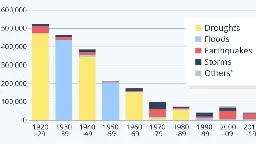
- How To Work A No Till Garden In Spring - Cover Crops, Planting & Moreoldworldgardenfarms.com How To Work A No Till Garden In Spring - Cover Crops, Planting & More
See how to maintain and plant a no till garden in the spring - including how to mow off and incorporate your fall cover crops.
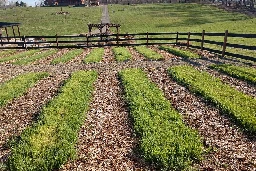
>So how do you maintain and plant a no-till garden in the spring? And what do you do if you have cover crops growing in the garden, but have early seed crops or vegetable transplants that need to go into the ground? > >All of those questions and more have been rolling into our website over the last few weeks. And as spring hits full stride, we thought it was the perfect time to cover the various tasks, chores and topics that make up working in a spring no-till garden. > >Especially when it comes to what to do with cover crops growing in the garden, early seed sowing, and planting transplant crops as well.
- Savoring the Pastsavoringthepast.net Savoring the Past
Savoring history's repast. Discovering flavors not lost but forgotten

Collection of recipes and advice from the 18th century. Pre-electricity and modern conveniences.
- [Question] Gas mask (for smoke)
With all these fires going around and the potential of house fires a quick question about gas masks.
Is the RD40 40mm thread EN-148-1 the same as the STANAG 4155 Nato thread?
Would a draeger rd 40 filter fit a MP5 Gas mask ? Or a military nbc filter fit a draeger x-plore-6300?
Edit: Just want to know if the civilian and mil spec threading is identical.
- [Discussion][EU] Short- and longterm plans
Hi,
sitting in a bigger City in the center of Europe I realised, that I have the short term problem covered, but no real plan for long term inconveniences.
To be clear, in my opinion this is tailored to the EU as the USA has a vaster landscape, and a different infrastructure in regards to power and food delivery. The point is, that almost all European countries can be traversed in one day, so in case of regional events help and relief could be there faster.
Bug in
I have in accordance with the Federal Office of Civil Protection and Disaster Assistance goods to stay self sufficient for about a week, maybe more. Because of a hiking and camping hobby, I have everything to deal with colder weather. So, I have some gear and skills which can be put to use.
Bug out
Hopefully seeing the signs early enough, I plan to leave town when everyone goes mad. I plan to head towards family and friends, which have houses and are situated more rural. I have one bag packed which would help me to make the way by bike or by foot. But actually I hope to have a car until then, or that the trains are still going. Anyhow: I would make my way out with a dedicated place to go and would stay there until I can come back.
But what If there is nothing to come back, too? I mean, if something is fundamentally changing the world or my country as it is? Would it be okay to stay with said friends and family and to build up a community that watches after each other?
I have certainly no clue but with this densely populated European countries the many times dreamed up living in the backcountry is no real option -- simply because there is not enough backcountry to provide for all the people.
What is your take?
- [Discussion] [EU] Cheat Sheets for BOB
I am about to print and laminate DIN A6 cheat sheets that go into my BOB.
What would you add to the essentials (in Germany/Europe)?
E.g.
- Maps of ROIs
- Basics for landnav
- Fire setups (warmth vs cooking, which wood)
- Radio frequencies (and their usage)
- Water Glassing Eggswww.farmhouseonboone.com Water Glassing Eggs
Springtime on the homestead means more daylight, and happier chickens. Happier chickens make more eggs, and thus, we have an overabundance to deal with. In order to have plenty in the fall and winter months,

>Water glassing eggs involves submerging clean, unwashed, eggs in a pickling lime and water solution to seal off the shell and preserve them for 12-18 months. The result is perfectly fresh, unspoiled eggs, just like they were the day the hen laid them. Sometimes properly water glassed eggs are still fresh even after two years. Homestead folks have been using this preservation method since the 1800s to capitalize on the springtime egg abundance year round.
- Three found dead in Rockies after trying to live 'off the grid'ca.sports.yahoo.com Three found dead in Rockies after trying to live 'off the grid'
The decomposed and partially mummified bodies of three people who were recently found at a remote western Colorado campsite were two adult sisters and one woman's 14-year-old son, Gunnison County Coroner Michael Barnes said. The deceased are Christine Vance, 41; Rebecca Vance, 42, and Rebecca's son...
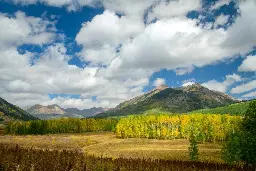
>The decomposed and partially mummified bodies of three people who were recently found at a remote western Colorado campsite were two adult sisters and one woman's 14-year-old son, Gunnison County Coroner Michael Barnes said. > >The deceased are Christine Vance, 41; Rebecca Vance, 42, and Rebecca's son, all from Colorado Springs. Two were found in a tent down the road from a campsite in the Gunnison National Forest about nine miles (14.5 kilometers) from Ohio City, Colorado, Gunnison County Coroner Michael Barnes said in an interview Tuesday. Officials have not named the son because he is a minor. > >Their bodies showed signs of malnourishment, with two in the tent and one outside. Though a cause of death has yet to be determined while authorities wait for toxicology reports to be processed, the group may have succumbed to starvation, freezing temperatures or carbon monoxide poisoning from trying to make fire to stay warm, Barnes said.
- Xe-Mobile — Advanced Micro-Mobile Nuclear Reactor Solutions — X-energyx-energy.com Xe-Mobile — Advanced Micro-Mobile Nuclear Reactor Solutions — X-energy
To address the need for ground, sea and air transportable small power production, X-energy has developed nuclear reactor concepts with potential civilian government, remote community and critical infrastructure applications.

The ultimate prepper power supply! Runs 2-7 MWe for three years.
Anybody have an idea of the cost? I can't find anything.
- Rainwater Cisterns: Design, Construction, and Treatmentextension.psu.edu Rainwater Cisterns: Design, Construction, and Treatment
Roof-catchment cisterns are systems used to collect and store rainwater for household and other uses.

An article from PennState Extension. Click the link for more.
>Roof-catchment cisterns may also be used to supply water to farms. Watering troughs and rain barrels can be filled by water collected from barn and other out-building roofs. A storage cistern built alongside a barn or other building could serve as an emergency source of water for firefighting in the event that a pond were not nearby. However, the use of rainwater for supplying domestic water needs is not without its problems. > >Water quality is of concern especially when the rainwater is to be used for drinking purposes in addition to other domestic uses. Rainwater and atmospheric dust that are collected by roof catchments contain certain contaminants which may pose a health threat to those consuming the water. Lead and other pollutants may accumulate in cistern bottom sediments; and untreated rainwater is quite corrosive to plumbing systems. Measures must be taken to minimize these and other water-quality problems in cistern systems. Recommendations for doing this will be presented, as well as guidelines for designing and building roof-catchment cistern systems. > >Rainwater cisterns can provide water of adequate quantity and quality if proper steps are taken in the planning and construction stages, and periodic maintenance is performed throughout the life of the cistern.
- Rules
> Be polite and be excellent to each other.
Beyond that follow lemmy.worlds rules.
( We might adjust our rules, as we go along :-)
- Check your sources
A quick reminder to check your sources of information, and a big disclaimer for an incoming rant
A friend of mine just came along with a youtube video talking 2023 power management in Germany and the video was far beyond conspiracy and resonated too heavily.
A key competency should be to check sources for relevance by questioning the presentation style:
- Wording preset to inflict fear and insecurity
- Wording preset to stimulate a conflict (we against the others)
- Author profits, e.g. by promoting his store/hardware
- Author evades naming further sources
- Author use portions of statistic / single sources to "proof" his point
If all that checks, oh boy. Maybe the source is not as independent, philanthropic or enlightened as you thought it would be. Especially the point with the sources is something I come along in many discussions lately...
- Starvation Setting - Who dies first?
cross-posted from: https://lemmy.world/post/1077374
> According to the statistics from the Donner party, it's better to be a woman between 20-39. > > https://www.researchgate.net/figure/Donner-Party-Members-Sex-and-Survivorship-by-Seventh-Census-Age-Class_tbl3_268376085 > > Now, what about fat vs skinny? > > >Within one or two days of your last meal, your body will have exhausted all the glycogen stored in the liver and muscles. Most of your energy requirements will be met by breaking down stored fat into ketones, but brain cells and red blood cells can't metabolise ketones, so their glucose requirements must be met by breaking down muscle. > > > >Even if you have lots of body fat left to burn, you can still starve to death if you don't have enough muscle because vital muscles like the heart will have been weakened to the point where they stop working. For this reason, doctors normally consider 40 to 50 per cent weight loss as life-threatening, regardless of your initial body weight. > > > >Total starvation is normally fatal in eight to 12 weeks. In less extreme cases, however, where you are still receiving some calories - particularly if these calories include a high proportion of protein - being fat will help you survive much longer, because your body will be able to meet the majority of your calorie requirements from stored fat. > > https://www.sciencefocus.com/the-human-body/who-would-die-first-of-starvation-a-fat-or-a-thin-person/ > > So, if you know help will eventually get to you, being a larger woman is to your benefit. If you know help is probably not on the way, being a fit man or woman is most likely your better bet, as you'll need to be active in hunting down prey or searching for other food sources.
- Homecare Nursing: Survival Medicine's Missing Link - Survival Momthesurvivalmom.com Homecare Nursing: Survival Medicine's Missing Link - Survival Mom
Homecare nursing is the piece many preppers seem to be missing. It's not complicated, but it could be the difference between life and death.

>The most ignored area in medical training that I have seen in survival circles is homecare nursing. Per longtermcare.gov, a person age 65 has a roughly 70% chance of needing some type of long-term care services and supports before they die. However, it’s not just the elderly who may require homecare nursing. Anyone with special needs may also require more specialized care. > >So while it may be a boring subject, but it’s an absolute necessity to keep your patient alive and viable.
- The Knowledge - Treasure Trove of Useful Infothe-knowledge.org -
The official website that accompanies The Knowledge, the best-selling book by Dr Lewis Dartnell.
Read this book recently, just putting it out there in case anyone hasn't come across it yet: http://the-knowledge.org/en-gb/ There's a lot of useful stuff there, the basic idea is to enable people to develop basic technologies from scratch, a 'quick-start guide' to a technological civilisation.
The website also has some interesting prepping ideas on it, e.g the 'apocalypse-proof kindle'
It also occurred to me while reading it: good quality education in a resilient society would allow people to reproduce something like this. Yet despite almost 2 decades of formal education, a lot of it was completely new to me.
Would have been nice if Dartnell put up the whole book for free on his website but I guess he needs to make a living. It is, however, available for free on archive.org and also z-lib.
- Salt
We don't think much of it because it is so common. Consider, though, how many ways there are to use it. Flavoring, curing, preservation, etc. Plain salt has no expiration date, but flavored does.
Shelf life:
https://www.scienceworld.ca/stories/ever-wonder-about-iodized-salt/
https://www.mortonsalt.com/article/morton-salt-expiration-guide/
If shit were to seriously hit the fan, salt could once again become a much sought after commodity. It has been so important throughout history that at one point it was worth more than its weight in gold. Roman soldiers received part of their pay on the frontier in salt, and, in fact, the word "salary" comes from "salt".
If you live near the ocean, you can even produce your own, thus insuring a steady supply and even trade goods.
If you are simply interested in the history of salt, I recommend this as an audiobook:
https://www.amazon.com/Salt-World-History-Mark-Kurlansky/dp/0142001619
- Water treatment plants would be ready for the removal of nanoplasticswww.eawag.ch Water treatment plants would be ready for the removal of nanoplastics
The biologically active, slow-flow sand filters of lake water treatment would remove nanoplastics from the raw water very efficiently. This was shown both in the laboratory and in larger, realistic tests and modelling.
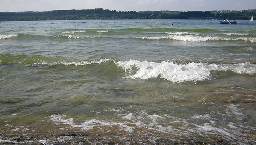
>The biologically active, slow-flow sand filters of lake water treatment would remove nanoplastics from the raw water very efficiently. This was shown both in the laboratory and in larger, realistic tests and modelling.
This is good news for those who are deciding upon what kind of water treatment system to implement. This is dependent, of course, upon how badly the SHTF, resources available, and permanence of location.
- Refugee Food Allowance
I was curious about how little you can do with to survive and started looking around. Then I thought about refugees and how many governments give them the bare minimum. If SHTF, you could expect a bare minimum package if the disaster were widespread enough. Also, this will give you a guide as to how much you'll need to survive.
A Syrian refugee in Jordan receives the following. These are rations for one adult for one week:
- 420 g of rice
- 400 g plain flour
- 400 g tinned kidney beans
- 170 g dried lentils
- 85 g dried chickpeas
- 125 g tinned sardines
- 300 ml of vegetable oil
- 400 g flour coupon
- 1.5 kg rice coupon
You'll be making a lot of flat bread and hummus to go with your rice and beans. All of this is taken from: https://www.sbs.com.au/food/article/2017/06/14/why-i-will-be-eating-syrian-refugee-week
Page 57 of this report breaks down a diet analysis in one of those camps:
https://www.fsnnetwork.org/sites/default/files/a_cost_of_the_diet_analysis_in_azraq_refugee_camp_jordan.pdf
- Emergency kits -- regional information
Do you know of any regional sources/information on useful emergency kits?
I now for Germany there is a leaflet distributed by the BBK (Government) and I just found out about https://www.ready.gov/kit in different languages for the USA.
Any further sources/countries to add?
- [Updated] Offline data and reading material - 07.2023
As suggested at a previous post it might be good to have some offline data stowed away.
May it be in form of a prepared mobile device, a pen drive or a hard disk. Some even suggest Raspberry Pi setups, which make it easy to serve/share data in a hotspot WiFi — aiming more at TEOTWAWKI situations.
One thing is for sure: having a (encrypted) pen drive with essential proof (IDs, licenses certificates, etc.) should be the bare minimum. As pointed out below you want to considered long-term storage like an M-DISC or swap the drive on a regular basis. You also need to update your outdated files, so you might want to do this in one step.
The topic and different approaches were often discussed at reddit and I'll try to give an overview and animate people to also post good digital reading materials and sources.
Wikipedia
We already mentioned the offline wikipedia with KiWix and ZIM-archived, browsable data:
- https://www.openzim.org/wiki/Build_your_ZIM_file
- https://youzim.it
- https://archive.org/details/zimarchive
- https://archive.org/download/kiwix_zimsets_201403
- Wikipedia Full http://download.kiwix.org/zim/wikipedia_en_all_maxi.zim ~83GB
- Wikipedia No pictures http://download.kiwix.org/zim/wikipedia_en_all_nopic.zim ~40GB
- Wikipedia Mini http://download.kiwix.org/zim/wikipedia_en_all_mini.zim ~10GB
Maps
You might also want to store map data with
- https://opentopomap.org/
- via https://osmand.net on your mobile devices
- via https://print.get-map.org printed as PDF and paper version
- US → https://www.usgs.gov/programs/national-geospatial-program/us-topo-maps-america
Coming from https://www.reddit.com/r/preppers/comments/oxbna2/prepper_hard_drive/ someone posted the http://survivorlibrary.com as good starting point, and an article shtfblog.com discusses a bug out library on SD/USB drives.
I will edit this post when I find the other sources in my archives and would be glad to incorporate your suggestions.
Edit
I have been skimming through several sub reddits like /r/preppers in search for a collection I once saw. However, you could also use Google and search for yourself.
Many of the sources are unchecked for quality. ⚠️ Some resources have an American touch and might address gun smithing, general warfare, military SOPs and field manuals as well as civilian sheltering and or resistance stuff.... because of, well.. it's an important thingy oversees. Sieving through these collections is an absolute must.
Collections
- https://www.reddit.com/r/preppers/wiki/books/
- https://en.wikipedia.org/wiki/CD3WD
- http://www.zetatalk11.com/docs/
wget -m http://www.zetatalk11.com/docs/to download all on linux/mac.
- https://www.preppingdeals.net/deals/amazon-free-ebooks-for-preppers-kindle-free
- https://www.cityprepping.com/2021/07/07/preppers-free-pdf-library/
- https://ferfal.blogspot.com/2012/11/100-neat-free-survival-downloads.html
- https://www.reddit.com/r/PrepperFileShare/
- https://app.box.com/s/38gyss6q4dgn80s5nmf2c7i1dmkzbh36
- https://www.survivorlibrary.com/
- https://blog.archive.org/national-emergency-library/
- https://archive.org/details/@icy_archers
- https://gingerybookstore.com/
- https://www.waterstones.com/book/practical-self-sufficiency/dick-strawbridge/james-strawbridge/9780241400845
- https://archive.org/details/PrepperJumble/
- https://www.reddit.com/r/Survival/comments/732c79/ive_collected_a_bunch_of_free_survival_pdf_links/
- https://www.reddit.com/r/DHExchange/comments/4645lm/s_4chans_k_newest_mega_torrent_the_ark_over_300/
- https://github.com/alx-xlx/awesome-survival
Medical Books
- https://docs.wixstatic.com/ugd/3b311a_6ef34fffc73447ce9a4d25a4d441b662.pdf
- https://armageddonmedicine.net/ -http://www.frankshospitalworkshop.com/organisation/biomed_documents/Where%20there%20is%20no%20Doctor%20-%20David%20Werner.pdf
- How Humble Moss Healed the Wounds of Thousands in World War Iwww.smithsonianmag.com How Humble Moss Healed the Wounds of Thousands in World War I
The same extraordinary properties that make this plant an “ecosystem engineer” also helped save human lives

>The First World War had just begun, and already the wounds were rotting on the battlefield. In the last months of 1914, doctors like Sir. W. Watson Cheyne of the Royal College of Surgeons of England noted with horror the “great prevalence of sepsis,” the potentially life-threatening response triggered by a bad infection. And by December 1915, a British report warned that the thousands of wounded men were threatening to exhaust the material for bandages. > >Desperate to get their hands on something sterile that would keep wounds clear of infection, doctors started getting creative. They tried everything from irrigating the wounds with chlorine solutions to creating bandages infused with carbolic acid, formaldehyde or mercury chloride, with varying degrees of success. But in the end, there simply wasn’t enough cotton—a substance that was already in high demand for uniforms and its recently discovered use as an explosive—to go around. > >What were the Allied Powers to do? A Scottish surgeon-and-botanist duo had an idea: stuff the wounds full of moss. > >Yes, moss, the plant. Also known as sphagnum, peat moss thrives in cold, damp climates like those of the British Isles and northern Germany. Today, this tiny, star-shaped plant is known for its use in horticulture and biofuel, not to mention its starring role in preserving thousands-year-old "bog bodies" like the Tollund Man, which Smithsonian Magazine revisited last month. But humans have also used it for at least 1,000 years to help heal their injuries. > >... > >Sphagnum moss also has antiseptic properties. The plant’s cell walls are composed of special sugar molecules that “create an electrochemical halo around all of the cells, and the cell walls end up being negatively charged,” Kimmerer says. “Those negative charges mean that positively charged nutrient ions [like potassium, sodium and calcium] are going to be attracted to the sphagnum.” As the moss soaks up all the negatively charged nutrients in the soil, it releases positively charged ions that make the environment around it acidic. > >For bogs, the acidity has remarkable preservative effects—think bog bodies—and keeps the environment limited to highly specialized species that can tolerate such harsh environments. For wounded humans, the result is that sphagnum bandages produce sterile environments by keeping the pH level around the wound low, and inhibiting the growth of bacteria.
- KiwiX is the tool to use to keep local copies of Wikipedia, iFixit, and many more.www.kiwix.org Explore Offline Wikipedia and Educational Content with Kiwix- Kiwix
Discover the power of Kiwix - your gateway to offline Wikipedia and a vast array of educational content. Access knowledge anytime, anywhere without an internet connection. Explore the benefits of Kiwix today.
>We can copy text, images, videos, just like the original thing – but highly compressed so that they are easy to share and distribute, for instance on a flash drive or microSD card, or broadcast on inexpensive hotspots. > >The Kiwix reader runs on almost any device (mobile phones, computers, etc.). For the end user it feels pretty much like a regular browser as the experience is almost identical to browsing the source website(s). Except that there is no internet.
- What to expect from this community?
Hi,
I've been around at several reddit counterparts of this community and always loved to interact with the more rational people and nerd around about gear, goodies, gadgets and techniques.
Are you (mod) already spreading the word, that there is this community around? This community looks a little bit "abandoned", already 🫢.
Best wishes, a887
